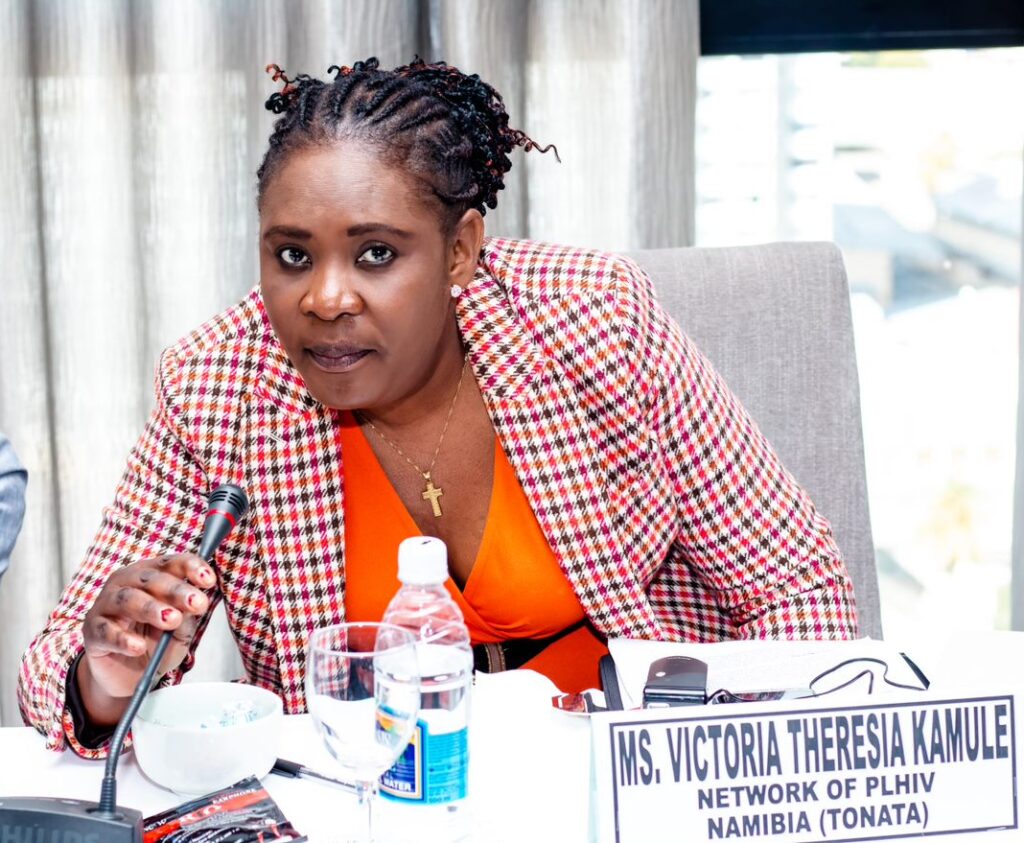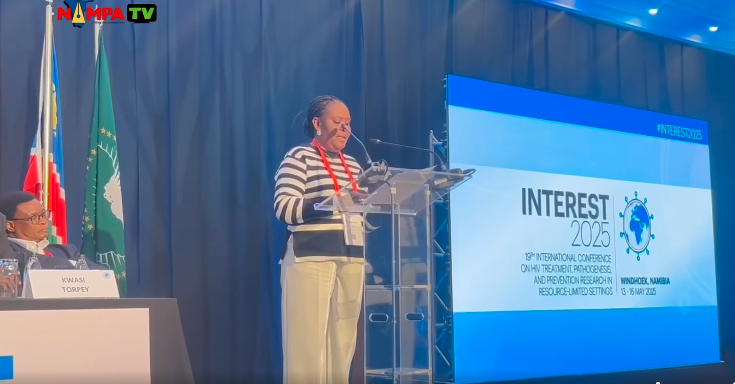
The annual INTEREST Conference—which took place this year from 13-16 May in Windhoek, Namibia—is the premier scientific conference for HIV in Africa. The conference brings together scientists from around the world who research HIV treatment, pathogenesis, and prevention and showcases cutting-edge knowledge in the diagnosis and treatment of HIV and the prevention of HIV transmission. It continues to foster a community of African physicians and scientists, facilitating the implementation of local solutions for the management of people living with HIV (PLHIV) and for the prevention of HIV transmission. Our Executive Director, Ms. Victoria Kamule, had the honor of representing the civil society organizations of Namibia and delivered an address at the conference. Drawing on Tonata’s deep roots in the community, she humanized the scientific discussion by grounding it in dignity, human rights, and solidarity—and brought forth a clear call to action: an effective and sustainable national HIV strategy must recognize the leadership of PLHIV and invest in community-led response.
Please find a transcription of Remarks by Ms Victoria Kamule, Executive Director, Tonata PLHIV Network, Namibia on the occasion of the 19 th INTEREST Conference:
Good morning, esteemed colleagues, distinguished guests, and friends,
In the interest of time and with all due respect, allow to stand by the Protocols already established. It is a great honor to stand before you today at INTEREST 2025, representing Tonata, Namibia’s national network of People living with HIV.
We gather at a pivotal moment — a moment that calls for introspection of our HIV response, honesty, courage, and actions.
What took us 20 years to achieve has brought us to our current position, but it will not take us to where we need to be by 2030. Therefore, we must re-strategize and innovate. Most importantly, we need evidence to inform our policies and practices, and that is why we are gathering this week.
For the Network of People Living with HIV, we may not have all the answers, but we certainly have lived experiences that serve as valuable evidence of what works and what does not.
Trust us, involve us, and let us be part of the solutions.
Namibia has made significant progress toward the 95-95-95 targets for HIV treatment, achieving 93% of people living with HIV knowing their status, 95% on antiretroviral therapy (ART), and 98% virally suppressed. These figures are among the best in sub-Saharan Africa.
However, this progress is fragile. The withdrawal of key funders, such as USAID, has placed unprecedented strain on community-level HIV response efforts. Community systems, outreach programs, and peer support networks have all been deeply affected.
At Tonata, we continue to serve over 29,000 people living with HIV across all 14 regions. We provide peer-led ART adherence support, treatment literacy education, stigma reduction initiatives, and community ART refill groups. Despite experiencing funding cuts of 40–50% over the past four years, we have managed to maintain our engagement with communities, the Ministry of Health and Social Services, and our partners.
It’s important to remember that behind every funding cut is a person—a mother, a young woman, a father, a son, a peer educator, a person who uses drugs, or a youth leader—whose life and future are put at risk.
As we work towards our goals, we must confront the ongoing inequities that persist. Women and girls continue to be disproportionately affected by HIV, with a prevalence rate of 15.1% among women compared to 8.2% among men. Additionally, Namibia faces some of the highest rates of gender-based violence and femicide in the region. Women who experience violence are 1.5 to 2 times more likely to acquire HIV.
Among adolescents, the situation is equally concerning. Only about 50% of adolescents living with HIV achieve viral suppression, highlighting an urgent need for investment in youth-centered services.
Recently, Namibia has made a commendable shift in its policy towards people who use drugs, moving from a criminal justice approach to a public health perspective. However, it is important to emphasize that an abstinence-only framework is insufficient. Emerging data indicate that the HIV prevalence among people who inject drugs may range from 8% to 15%, yet there are currently no formal harm reduction services, such as needle exchange or opioid substitution therapy, available.
Community-led efforts have always been—and continue to be—the foundation of Namibia’s HIV movement. Our peer-led ART refill groups have reduced the workload at clinics by up to 40% and improved patient retention in care. Community-based models consistently achieve cost savings of 15–30% per patient per year compared to facility-based care.
When people living with HIV are at the heart of the response, we see improved health outcomes, increased trust, and more resilient communities. We cannot afford to abandon the very systems that have driven this progress.
Today, I make an urgent appeal:
We need more than applause; we need resources.
We need sustained, flexible, yet predictable funding to retain the community-led HIV response.
We need investment in equity, justice, and empowerment—particularly for women, youth, and key populations.
We need to recognize the leadership of people living with HIV not as an afterthought, but as the cornerstone of our national strategy.
Without this, sustainability of the HIV response will remain an aspiration, not an achievement.
The HIV response has always been about more than diagnostic tests, monitoring and medicine; it has been about dignity, human rights, and solidarity.
Tonata stands ready to work hand in hand with all of you — to co-create a future where no one is left behind as we aspire to achieve under the Universal Health Coverage, where every life is valued, and where the promise of health and justice becomes a reality for all.
Thank you.

